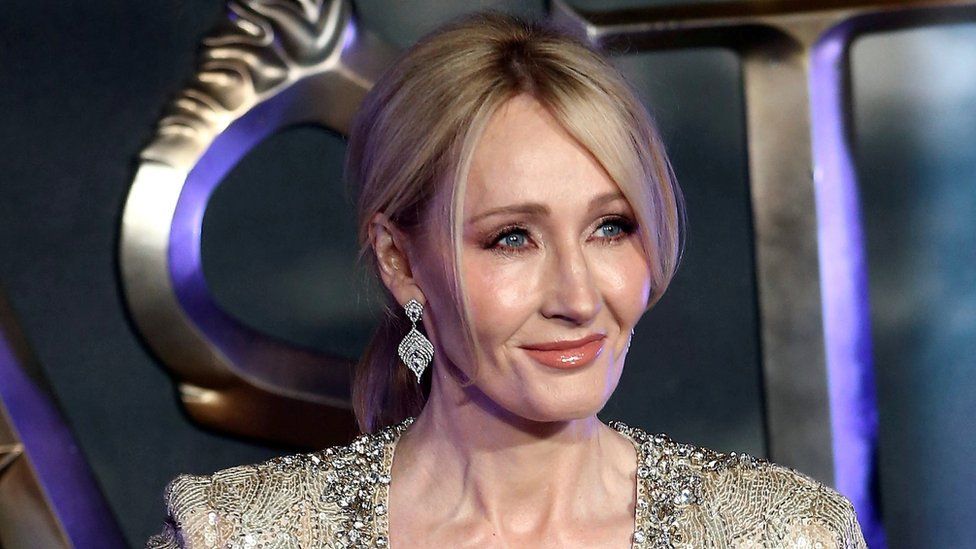JK Rowling joins 150 public figures warning over free speech
- Published

Some 150 writers, academics and activists - including authors JK Rowling, Salman Rushdie and Margaret Atwood - have signed an open letter denouncing the "restriction of debate".
They say they applaud a recent "needed reckoning" on racial justice, but argue it has fuelled stifling of open debate.
The letter denounces "a vogue for public shaming and ostracism" and "a blinding moral certainty".
Several signatories have been attacked for comments that caused offence.
That includes Harry Potter author JK Rowling who was fiercely criticised this month for comments about transgender people.
A diverse cross-section of figures from across the globe put their names to the letter which was published on Tuesday in Harper's Magazine.
It includes US intellectual Noam Chomsky, eminent feminist Gloria Steinem, Russian chess grandmaster Garry Kasparov and author Malcolm Gladwell.
Several have had works banned in some countries, including British novelist Salman Rushdie, who lived in hiding after receiving death threats for his 1988 book Satanic Verses.
And at least two novels by Syrian writer Khalid Khalifa that criticised Syria's government were banned in his home country.
Watch former US President Obama talk about "woke" culture
Other signatories are prominent historians of race and slavery, including Nell Irvin Painter, who wrote The History of White People and David Blight, who heads Yale University's Gilder Lehrman Center for the Study of Slavery, Resistance, and Abolition.
Many have been in public life for decades, while others are younger including 29-year-old activist Sarah Haider, whose organisation Ex-Muslims of North America aims to normalise religious dissent.
What does the letter say?
"The free exchange of information and ideas, the lifeblood of a liberal society, is daily becoming more constricted," suggests the letter.
It also says: "We uphold the value of robust and even caustic counter-speech from all quarters.
"But it is now all too common to hear calls for swift and severe retribution in response to perceived transgressions of speech and thought."
The letter condemns "disproportionate punishments" meted out to targets of public shaming by institutional leaders conducting "panicked damage control".
What it's like to be "cancelled"?
It goes on to warn of fear spreading through arts and media.
"We are already paying the price in greater risk aversion among writers, artists, and journalists who fear for their livelihoods if they depart from the consensus, or even lack sufficient zeal in agreement," it says.
It adds: "We need to preserve the possibility of good-faith disagreement without dire professional consequences."
What are they taking aim at?
In recent months, a number of figures have been shamed online for making comments considered offensive by some, including on topics of race, gender and sexuality.
In some cases, employers took action against the individual after sustained and targeted criticism.
The letter suggests: "Editors are fired for running controversial pieces; books are withdrawn for alleged inauthenticity; journalists are barred from writing on certain topics; professors are investigated for quoting works of literature in class; a researcher is fired for circulating a peer-reviewed academic study; and the heads of organizations are ousted for what are sometimes just clumsy mistakes."
President Trump: "Angry mobs are trying to tear down statues of our founders."
In June, the New York Times' opinion editor resigned amid outrage over a piece by a Republican senator calling for military forces to be sent to cities where anti-racism protests had turned violent.
Opinion contributors to the newspapers David Brooks and Bari Weiss added their names to the letter on Tuesday.
Last year a US professor who quoted a racial slur from a James Baldwin book in a lecture at New York's New School was cleared on charges of racial discrimination.
And in January, publisher Flatiron Books cancelled author Jeanine Cummins's tour after her novel American Dirt was strongly condemned for stereotypical descriptions of Mexicans.
What has the response been?
There has been a huge online response to the letter, with the Index on Censorship calling it an "important letter on open debate".
Irish novelist John Boyne tweeted in support, writing "hounding people for perceived moral slip-ups" is the "opposite of free speech".
One signatory - Matthew Yglesias, co-founder of liberal news analysis website Vox - was rebuked by colleague Emily VanDerWerff, a trans woman, who tweeted that Yglesias signing the letter "makes me feel less safe at Vox".
But VanDerWerff said she did not want Yglesias to be fired or apologise because it would only convince him he was being "martyred".
Signatory Jennifer Finney Boylan, a US author and transgender activist, apologised within hours of the letter being published, tweeting "I did not know who else had signed that letter".
Critics have tweeted past comments by signatories JK Rowling and Noam Chomsky on topics including transgender rights and genocide denial.
Others argued that those who signed the letter were overreacting.
"It's hard to take claims like this seriously, especially when it's plain that people are complaining about an unprecedentedly free and open speech environment," tweeted journalist Osita Nwanevu.
And some suggested that many of the signatories are high-profile figures who benefit from access to institutions that readily publish their work.